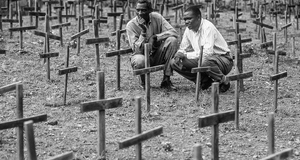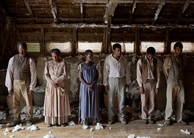Featured Opinion:A Critical Analysis of the Rwanda-Burundi Genocide and the Sociopolitical Implications of Colonial Rule in Africa
By
2010, Vol. 2 No. 07 | pg. 1/1
KEYWORDS:
There has always been a great deal of intrigue as to why certain people and certain parts of the world are cursed with such a greater deal of suffering than others. Over time certain societies have developed through a series of phases of modernity and civilization to become more successful. Industrialization has strengthened economies, research has advanced technology, science has made discoveries in healthcare, and the result has been that some people in some parts of the world enjoy significantly higher standards of living than those elsewhere. What is also striking is how development has been stagnated in many parts of the world. In this fashion, with different societies having progressed at different rates, the groudnwork has been set for a perilous balance of power in the world. In particular, certain parts of Africa are home to some of the greatest suffering on earth. The history of a large majority of the African continent has been plagued with the deterioration of ethnic relations and severe economic hardships. Communicable diseases, malnutrition, starvation and political instability have left countries to bleed dry. Stripped of the ability to move towards a higher standard of living, with the exception of a few cases, many African countries are falling into despair while the rest of the world waits like vultures to take what they can from the destruction. Machiavelli and Hobbes described the world as a constant state of fear and chaos, dominated by man’s instinctual self-serving and violent human nature. If this is the way in which we choose to accept the world in its most natural sense, could certain atrocities in our history have been avoided at all or were they simply the result of mankind’s instinctual behavior. For the purpose of this analysis I have found the trend of colonial rule to be coincidentally paralleled to a number of the worlds most perplexing acts of inhumanity, in particular the Belgian colonization of the Rwanda-Burundi region prior to the Tutsi-Hutu genocide.Over time, Western powers have found it wildly prosperous to impose their authority over weaker nations, leaving continents in the wake of their tyranny. The effects have been irreparable. Manipulation of weaker people is so entrenched into the history of the world that it has become profoundly imprinted in the psychosocial philosophy of international relations to this day. If we can understand colonialism as either an act of human nature or perhaps a vital flaw in foreign policy, then it may be possible to introduce a solution to avoid mass human rights violations. What truly inspires me is the possibility of being able to apply the trend of colonialism in its original sense, to politics of today. This approach could afford us the invaluable opportunity to prevent the outbreak of a fundamentalist antagonism in their early stages of development. Perhaps there are significant underlying differences in structure of these civilizations that allowed for colonial invasion to occur so successfully, but differences nonetheless that would have encountered conflicts in evolution the towards modernization. Is colonialism indeed responsible for the widespread downfall of its African territories, and did it set into motion precedence for ethnic rivalries? Colonialism has had profound implications on a range of lasting parameters throughout the theoretical and philosophical study of political relations. The first that I will address is the psychology behind terminology we use to explain certain events and how this may be responsible for changing the outcome of a situation. Within colonialism there are undertones of greater paradigms that are cause for intrigue in the study of global political relations; how theology affects politics, education and media as political motivators, the violent nature of political relationships and the inherent nature of inequality in the world. The mental images that have come up since the introduction of this topic are surely unique to you as the reader, and without a doubt they will be responsible for the way in which you so interpret the content of this paper. Interpretation of the world is, quite simply, the first step in understanding it’s perplexing calamities. On a very basic level, “we don’t live in the world on our own and somehow need to find ways of accommodating each other” (Pin-Fat, 23). The dilemma confronting us is the way in which different perceptions of ethics and morality coexist, if at all. Ideological differences will always, as they should, prevail, and if we are to approach them in collaborative manner, the first step is creating defining the issue and recognizing the implications of certain terminology. An acceptable definition of the term colonialism is as follows: “A policy by which a nation maintains or extends its control over foreign dependencies. The two main types of colonialism are movement of people from the mother country to a form a new political institution in the designated distant land, and external powers’ rule over indigenous peoples (Spiegel, 59).” Even if a universal definition can be agreed upon, which is rarely the case, it is almost impossible that the connotations and allusions of such a term will be the same throughout; the socialization experienced by a given person will define the perceived definition of the term. Essentially, I do not believe it is possible for bias and human emotion to fall away. For the general public, colonialism has connotations almost solely with the period from the early 1900’s to the early 1960’s revolving around European possession of foreign territories. I am hesitant to accept the way in which the term has become so isolated in time, since it defines a process not an event. This is troubling for a number of reasons, mostly because, as I will present shortly, the Western world has always had an eminent sphere of influence on the developing countries which are comparable to colonial governance of the 1900’s. The period of colonialism is long from over. In such a way colonialism has become a time frame, where post-colonialism is simply the period directly following ‘independence’ and implying that other powers have abandoned former abusive practices. What seems to be a more realistic interpretation is that the period of ‘post’ has been quite radically extended and may still be today. This blatant classification of terms simply marginalizes as well as isolates the crisis from being of critical relevance to modern-day politics. The words become trapped in a time capsule along with others such as ‘slavery,’ and in this way we fail to realize their eminent severity in our societies. The way I see it, slavery was not abolished after ‘Abolition;’ a person who is not compensated for work is a slave, a child forced into the sex trade is a slave – and pretending this isn’t prevalent today is simply ignorance. For the purpose of this paper I hope to reestablish these terms into our contemporary vocabulary in a way that they may attract more mindfulness and urgency. A great deal of what orchestrates the political world are perceptions. Our fears are a cultivation of what we perceive as threats and how we perceive ourselves in the world. As mentioned above with regards to terminology, propaganda and education are a powerful aspect of socialization because they are what teach us to think a certain way. Through the time of colonialism propaganda acted to suppress voices of dissent and create a world culture that accepts the white man’s rule. By nature, political control thrives on cultivating public opinions in its favor - be it Chairman Mao’s Little Red Book or the Nixon Administration’s Cold War “survival kits” and anti-Communist posters. Beginning as early as 1908, when Congo came under control of the Belgian State, they began a series of colonial exhibits to promote ‘the colonial idea’ to the Belgian population, largely isolated from African affairs. These nationalistic exhibitions centered on supposed representation of “before and after” Belgium and were largely contributors to circulating propaganda that cultivate colonialism into a widespread European practice. More importantly thought, Belgians hoped these images would send the message that Belgium was a powerful competitor on the international arena, that they had brought civilization to central Africa and that it was a sign of King Leopold II success in the world. Figure C illustrates one of these posters on display in Marseilles in 1906, illustrating a colorful embellishment of a colonizer-host relationship far removed from actuality, and perhaps they were wise enough in this regard to limit the expositions to outside Africa’s borders. Because education systems have developed at such radically different rates and in such different ways they are accurate indicators of a country’s level of economic development. Because there was no centralized education system in place when colonizers arrived in the Rwanda-Burundi region, independence left many African countries with the curricula and teaching methods developed by their missionaries and members of the Church. For the most part these were teaching methods that had long since been abandoned by the Western world for being outdated and repressive of critical and creative learning, but because there was no effort made to replace these materials, communities relied heavily on them. At this point it must be addressed that regardless of how flawed and expired the schooling tools they had been left with, it was nonetheless an introduction to the value of education. Arguments are made that it disabled the re-creation of social identity within countered and thus deprived them of re-nationalization after independence. Accounts of some of the curriculums in African schools reveal teaching practices nothing short of brainwashing that were imposed to implicitly create a psyche of inferiority to white supremacists. Umez reveals some phrases he remembers learning as a child in Nigeria: "oyibo bu ndi muo," (white men are naturally spirits),…"America ilu oba" (… white man's country is naturally the land of kings), "dan bature," (…white men are by nature civilized), and " buter" (…symbolizes the natural lead of white men)… This is deeply sobering; the consequences of intruding upon the psychological development of a nation’s children must be one of the most tragic violations of sovereignty possible. This trend simply allows for Western powers to instigate a potential inferiority complex, allowing them to rule by invisible hand long after independence. Colonialism finds it’s place not just in propaganda but similarly in literature. Tintin, what would appear to have been a harmless comic book created by the French author Hergé, is actually a source of political undertones that offer valuable insight into societal reactions to colonialism at the time. Hergé offers a radically different account of colonialism in his colorful comic “Tintin au Congo” than does British novelist Joseph Conrad in the classic 1977 “Heart of Darkness.” Shortly after territories started gaining independence, Hergé started to receive wide criticism for glorifying colonial bigotry, notably the scene in which Tintin presents to a classroom full of Congolese children, ''My dear friends, today I will teach you about your fatherland: Belgium!'' (figure E) was recalled from publication1. Some government officials of the Democratic Republic of Congo responded to this popular Belgian trend, stating that they did not feel targeted by its message, yet realized that for the Belgians, it “made it easier to discriminate against the Congolese” (Onishi, 1999). There was never a documented response on the part of the Congolese public with regards to “Tintin au Congo,” and there is no way to be sure what Hergé’s intentions for such controversial cartoons could have been, but the book’s popularity speaks for itself. There is such a gross stereotype in the way the Congolese school children have been drawn with an uncanny resemblance to the United States’ “blackface” caricatures in the in the 19th century. Living in Cameroon, a Francophone country and former French territory, my sister and I attended a French elementary school and became fond of Tintin. No political or social commentary was ever made, that I can recall, yet this seemingly innocent comic book had deeply rooted racial implications that could only have been subliminally influential upon a child’s psyche. I find myself distracted by the irony of the fact. Is it redeemable to say that potentially racist literature is only such if you perceive it that way? This is not something that I will attempt to answer here, however the societal implications of these cartooned Congolese would be received much less favorably today (enabling me to condemn its political incorrectness). Something that traditional theories could not have been accounted for with regards to human nature is the modern element of the global modern economy. In the simplest sense, however, the same instincts that drives human nature is what drives the economy – it is the push and pull for survival. What makes this relevant is that a successful economy is paralleled with a higher quality of life. Thus, understanding how (or if) economies have been hindered by the consequences of their history allows us to study this rather than ideological inferiorities. For an economy to be successful, self-sufficiency is absolutely necessary. Under colonial rule, territories were forced out of a very basic level of subsistence farming and hunting into a system of surplus production. The value of labor became a new element, however the structure was a fixed market economy with regulated supply and demand. In a sense, there was a contract between the host nation and the colonial power in which exploited labor and resources were sold on the Western market. This relationship was neither a mutually beneficial nor a consensual one. Initially this created a demand for foreign goods like coffee, tea, cotton, cocoa and later diamonds. It was an important move to introduce these previously isolated nations into the international market, a great deal of the raw goods we use and rely on every day come from that part of the world. The idea of integrating new markets into the global economy operated under a number of assumptions. First, we assume that the goods are purchased at its value and labor is compensated appropriately. Second, there must be a legitimate opportunity for these countries to trade fairly without dependence upon its past colonizers. That is to say, if countries rely solely on export to past colonizers they will be forced into unfair trade agreements. Third, it assumes that people accustomed to subsistence agrarian practices will be able to make the transition into large-scale commercial farming. By no coincidence whatsoever, there was a distinct sense of white supremacy, that Africa was a lost land of cannibalistic savages. The Belgians were notorious for this reaction to Africa, although by no means were they alone in their racist beliefs. The Hamitic hypothesis, allowing the Belgians to perceive Tutsis as sons of Noah who had been expelled from the civilized world (which is why they where black and doomed to live in Africa), is an explicit superiority complex. Figure C is an example of one of these identity cards; the holder’s ethnic group is selected, similar to the practices in the Congo (now Democratic Republic of the Congo), where Belgians referred to Congolese who had received Belgian-style education as ''les evolues,'' or ''those who have evolved'' and, just like in Belgian East Africa, marginalized them with identity cards (Onishi, 1999). This notion that evolution might be a progression towards Westernization is something that Darwin was also familiar with. Darwin explicitly taught of the white man’s superiority through the course of natural selection and in doing so would violently force blacks “and lesser races” out of the gene pool (Darwin pp. 31-33). In the same line of thought, there is something that does not seem justifiable in reverting to a sort of counter-racism, white supremacy altogether being held responsible the less economically developed world. The Berlin Conference was the single event responsible for dictating what foreign territories fell under which government. It was an attempt to resolve what was called ‘The Scramble for Africa’; disputes between the major world powers at the time: the Austro-Hungarian Empire, Great Britain, Germany, France, Russia, Italy, Spain, Portugal, Netherlands, Belgium and Sweden-Nosrway. Exclusion of African leaders was rationalized in terms of eugenics and superiority, as was previously alluded to. Desire for territories abroad transpired as capitalist economies began to expand along with wide global exploration and to satisfy the need for cheap labor after the slave trade had effectively been abolished. Not only that, but it was the perfect opportunity for those in the lower to middle class to exploit resources and labor, living much more luxuriously (larger land ownership, servants, livestock, crops, etc.) than would have been possible in Europe. This raises the question of morality, because if slavery had been irradiated how could a subsequent enslavement of natives within their own sovereign land be justified? Clearly it cannot be. The missing link that brought on the Berlin Conference is evidence of severe gaps in the integrity of human nature and collective engagement of so-called civilized powers in human rights violations acting as legitimacy. For a number of reasons, I have chosen the Rwanda and Burundi conflict to consider the hand Belgian colonial rule may have had in the 1994 genocide. First, the ethnic implications of their colonizing practices were distinctly marginalizing. It must be established whether the ethnic divide is one that would have been so dangerously personified regardless of Belgian presence. Second, unlike some of the other African nations such as Ghana, Tanzania and South Africa that fell under different colonizers, the economy in these two countries has not been able to sustain itself even to the slightest degree. This suggests that the distinctive way in which different Western countries governed may have been influential precedence. In other words, perhaps it was not colonialism in itself but more importantly colonialism under what government. In this way, I will conduct a three-part analysis: colonial policy, followed by a counterfactual analysis paired with Rwanda-Burundi’s pre-colonial politics. In 1918, under the Treaty of Versailles, the Rwanda-Urundi territory changed hands from German to Belgian control and became Belgian East Africa. The region was made up of three predominant groups: Tutsi, the Hutu, and the Twa. Among them there were shared religious beliefs, a common culture as well as a shared language, Kinyarwanda. Hutus, the majority group, were peasants of Bantu descent. Tutsis on the other hand were cattle herders and generally of a taller stature and according to the Belgians appeared more European in physicality. Twa remain only in 1% of the population and because being hunter-gatherers their nomadic trade allowed them to avoid a great deal of Belgian laws and regulations. Governing these three groups, Belgian colonizers made conscious choices with regards to “phenotypic” and financial characteristics that would instill deeply rooted ethnic marginalization for generations to come. The Belgians justified this favoritism under the notion that Tutsis were descendents of Ham, the son of Noah, cursed and banished to Africa and thus more elite than the Twa and the Hutus. Clearly there are religions undertones that prioritize the way in which the Belgians performed their governing practices; separation of Church and State was not restrictive whatsoever since policy making went hand in hand with theological ideologies. These distinctions were soon institutionalized when Belgians began nominating members of the Tutsi minority to positions of power to rule over the rest of the population in both Rwanda and Urundi (Burundi, now) separately. Compulsory identification cards were distributed discerning the holder’s ethnicity, determined by the ethnicity of their fathers (regardless of the fact that marriage between the groups was commonplace2), the size of their herd (those with 10 or more cows would be considered Tutsis), and discrepancies made by the Belgian Church. Automatically this granted preference to the richer cattle owners3, evidently revealing the true intentions of the Belgians to create a dominant upper class that had greater control over resources. The Tutsis were by no means treated as equals by the white imperialists, yet the political favoritism, Western-style education and privileges to local resources they received was enough to create a prevailing set of social differences. Notably, the education some of the Tutsis received was lead predominantly in missionary schools. As a result, racial elitism was set into motion; Tutsis adopted a sense of superiority and legitimized authority over their fellow citizens, who having been so deliberately neglected (and consequentially betrayed by their fellow Africans to the white powers) grew severely resentful. Because the people living in Burundi and Rwanda had a shared religion, there could never have been a divide on such grounds without introduction of the Western Church. When speaking of perceptions, it seems as thought the way in which Belgian colonizers interpreted the stratification among the natives to be on ethnic lines, contrary to the actuality, that it was a society structured by tribalism and industry. What became a matter of “ethnicity” could not truly have been defined in those terms prior to the Tutsi-Hutu identification cards because the two groups did not in fact differ with regards to race, religion, language and national or cultural origin. Perhaps Europeans saw classification on artificial nationalistic terms as much more meaningful than in terms of class, a feeling which may have been greatly motivated by a long history of nation-building in most European countries. That is not to say class did not exist in European nations, but realist notion may have motivated them to believe it was more important to be separated from outsiders. Just before the region gained independence in 1962 the Huts in Rwanda began a series of attacks against the Tutsi-led Belgian government killing thousands of Tutsis and sending 130,000 more into neighboring counties (DRC, Uganda and Burundi). As a result, Rwanda maintained a largely Hutu-dominated population strengthened by the abandoned plantations and cattle from the Tutsis who had fled seeking asylum, while Burundi, having gained a large influx of Tutsis refugees, grew to be a majority-Tutsi state. Burundi, stricken with the sudden overpopulation and scarcity of resources retaliated against the Hutus in attempts to regain control over the once Tutsi Rwanda region, only prompting a more violent massacre of over 10,000 more Tutsis. Rwanda soon became a one-party dictatorship when Habyarimana, a Hutu, overthrew the Belgian-appointed leader. Under his regime he continued the practices of ethnic discrimination developed by the Belgians, only in turn favoring the Huts, and refused to allow the Rwandan Tutsis to return home. Anti-Tutsi and pro-Tutsi sentiments were worsened to the point of extremism when greater freedom of press and political speech was granted, allowing for the publication of widespread propaganda such as the “Hutu Ten Commandments” and the “Hutu Power” newspaper Kangura (Wake Them Up)4 (Magnarella, 26-7). Under United Nation pressure Habyarimana signed the Arusha Agreement calling for greater Tutsi representation both in the government and in the armed forces, as well as the opening of Rwanda’s borders to all Tutsi refugees. Hutu radicals were unwilling to give up their power over the Tutsis, and April 6, 1994 a plane carrying Habyarimana on his return from Dar es Salaam, was shot down5, supposedly by a Hutu member of the president’s own military guard. Only hours later, Hutu militiamen armed with machetes began the outright murder of any Tutsi, political opposition, Hutu dissident, and UN humanitarian forces (including a number of Belgian troops). Eventually the Rwanda Patriotic Front managed to defeat the Hutu militias and, after having declared a ceasefire, attempted to create a new government, attempting once again to maintain the parameters of the Arusha Accords. The death toll, the number of displaced persons and the sociopolitical chaos is all at this point irrelevant. It was an irrational act drawn from the abstract animosities developed through years of severe psychosocial intervention by foreign governing practices. “The origin of the violence is connected to how Hutu and Tutsi were constructed as political identities by the colonial state, Hutu as indigenous and Tutsi as alien” (Mamdani, 34). The Belgians somehow managed to inadvertently create overwhelming Hutu nationalism fueled by a deep hatred for those who had been unjustly favored by a white power. As a result the Tutsis became a pawn in the Belgium government’s plans to expand their power and Hutus perceived this as the ultimate threat of internal betrayal.
This section is particularly relevant because it permits the mapping of society along the lines of evolutionary progress. According to the Marxist analysis, the ‘orthodox’ path of societal advancement will carry all societies through the primitive state of communes to feudalism. In pre-colonial African societies this progression had already commenced to the point where informal trade agreements among individuals and small groups had been established. Climate and topography of a region generally prompt the onset of a certain governing practices that best lend themselves to the accessibility of food and shelter. Before the arrival of Western influences, equatorial east African agriculture remained on a small-scale due to the unavailability of large expanses of land that could easily be cultivated. With productivity remaining low, and the difficulty in conservation of plantation corps, communities were never confronted with the dilemmas associated with accumulation of surplus. The onset of surplus productivity traditionally transitions into a society of internal exploitation practices and creation of a lower class. In the Rwanda-Burundi region, however, coexistence and collective ownership took precedence over pre-capitalist aristocracies (Gakou). In the United States, slavery was the response to the need for a large peasant class that could be repressed and uncompensated for their labor. The rigid class structure existing in Africa was limited to the community level, usually within tribes. Although the groups were already differentiated through industry and possibly wealth, there was never an apparent superiority with regards to ethnicity (Green, 733-755). There was an almost mutually beneficial symbiotic relationship wherein the three groups could exchange among their respective trades. Upon arriving in Africa, Belgians became aware of the lack of central power in a number of countries, which implied a significant weakness when it came to unifying defenses against colonial invaders. Powers seeking to expand will not attack stronger nations unless they feel threatened by their political influences or their military capabilities. It was almost as though they could rule over Belgian East Africa by turning its people against each other – essentially it was a divide and conquer tactic. If nations as a whole act upon the model of the individual man in the state of nature as theorized by Hobbes, then it would only be logical for Belgium to act in this way. There was no bond of loyalty or nationalism between the European colonizers and the African colonies; from the perspective of the Western World Africa was a distant and uncivilized land. But what it symbolized is of utmost importance. It was essentially the tiebreaker between the great powers of the world; those that reaped the most benefits from their colonies in Africa would extend their power on an international scale. From a purely security standpoint, it would be important for countries to build up their strength by gaining more resources to improve military capabilities, extending their power stations throughout the world and simply rise as a dominating world power. Politically speaking, colonization was a rational and necessary step that had to be taken in order to be a competitor and avoid being conquered by another. Another dimension that may help in distinguishing whether colonialism did in fact have an abnormal influence on changing the course of history in some of its territories is realizing the international response to the matter. The United Nations (UN) seems to be asking themselves just this: that we must “consider the causes and consequences of those ills which, historically, have been brought about largely by slavery, colonialism and wars of conquest.” The United Nations Sub-Commission on Human Rights Resolution 2002/5 clearly acknowledges the humanitarian aspect of the tragedy of colonialism as “crimes against humanity.” Reparations are directly addressed as something that the Powers are responsible to acknowledging. Having said that, it is not traditionally a matter of reimbursement monetarily but it is rather a societal paradox. Because the UN calls for improvement in the education system, it gives strong indications that the affects of colonialism had lasting psychosocial impacts that can only be reversed through teaching responsible human rights. This also makes allusions for gaining accountability for the matter not only in offering some type of assistance but because offering some type of external responsibility by a party not directly involved in the ongoing conflict could offer a chance for engagement. This is not to say that hatred for the western world is a safer option, or that we should arbitrarily point fingers, yet it sets precedence for the bipolarity of certain conflicts such as between the Huts and the Tutsis to be reevaluated where they can gain common ground. Many theories hold that it is conflict over scarcity and unequal distribution of resources that creates a platform for civil wars to break out. Rwanda and Burundi, along with many of their African neighbors were in a state of extreme scarcity due to the lack of farming technology, harsh natural conditions and the lack of access to health care and education. “No matter how depressing these facts may seem, we need to keep in mind that there is no necessary connection between a drastic reduction in resources and deadly human conflict” (p. 198). During the genocide, killing was in no way arbitrary - it was purposeful murder of historically implicated groups that had been defined in Belgian terms. The relationship between the Hutus and the Tutsis was so imbalanced that it essentially nourished ethnic fundamentalism on both sides. Upon conceptualizing the theory of colonialism it may have been attractive to take the approach blaming European governments for their implication of destructive political and economic policies in their host countries. No one wants to believe that certain civilizations are not capable of evolving in the same way the Western world has, and here lies the problem. It has become so socially unacceptable to distinguish certain ideologies as less successful, but, and I find this to be one of the greatest benefits of being raised in Africa, the truth of the matter is that a great deal of African society does not revolve around the capitalist norm. Without realizing the damages, societal norms are being disrupted in order to make them fit impractical Marxian laws of evolution, when it may altogether be possible that certain societies do not fit the mold. In light of maintaining an unbiased argument it is important to take the side of the aggressor as well as the victim. Development comes at a price, and in this zero-sum world it usually comes at the cost of another. Colonialism may well have been a power struggle between countries that had already reached an advanced level of development and weaker civilizations throughout the world were simply a means of determining which of them would become the most powerful. The truths of international politics dictates that exploitation is not much more than a survival mechanism, and in this sense Belgium profited substantially from their colonies which have since been left with political chaos, bankruptcy, inflation, overpopulation and reasonably incapable to developing any time in the near future. I warn against the damages of allowing nations to adopt the role of victim – it will not instill confidence and certainly does not bring justice to tyrannical leaders who managed to gain control after colonialism left. 1.) Some 15 years later, in attempt to redeem himself to the European public, he inserted a simple math problem instead the elitist phrase. 2.) Once genocide broke out between the Hutus and the Tutsis those related to a member of the opposite group were also targeted as complacence. 3.) Ironically enough when the Hutu militiamen conducted their mass genocide of any and all Tutsis, in a symbolic act of retaliation they ordered Hutus to kill them and “eat their cows.” 4.) Featured on the cover page of this paper, in December 1993, reads: "What arms could we use to destroy the inyenzi (cockroaches; meaning Tutsis) for good?" This magazine was published under the leadership of the First Lady of Rwanda. 5.) I remember being sent home from school on this strange and unsettling day for fear riots would break out in Tanzania’s capital city, were we were living at the time.
Gakou, Mohamed Lamine. Crisis in African agriculture. London: Zed Books, United Nations University, 1987. Print. Green, Lezlie L, Gender Hate Propaganda and Sexual Violence in the Rwandan Genocide: An Argument for Intersectionality in International Law, 33(3) Columbia Human Rights Law Review (2001- 2002), 733-776 John A. Berry and Carol Pott Berry (eds.), Genocide in Rwanda: A Collective Memory. Washington, DC: Howard University Press, 1999. 201 pp. Magnarella, Paul. "Explaining Rwanda’s 1994 Genocide." Center On Rights Development 2.1 (2002): 25-34. Print. Mahmood Mamdani, When Victims Become Killers: Colonialism, Nativism, and the Genocide in Rwanda. Princeton, NJ: Princeton University Press, 2001. 364 pp. McCullum, Hugh. "EDUCATION IN AFRICA : Colonialism and the Millennium Development Goals." News From Africa. Koinonia Community, 2 Mar. 2005. Web. 02 Dec. 2009. . M, Jenny Edkins:. Global Politics A New Introduction. New York: Routledge, 2009. Print. Nwabueze Umez, Bedford. "Educated" to Feel Inferior" Convention of the World Igbo Congress 8 (2002). Onishi, Norimitsu. "Kinshasa Journal; Tintin at 70: Colonialism's Comic-Book Puppet? - The New York Times." The New York Times. 8 Jan. 1999. Web. 30 Nov. 2009. . Randall, Vernellia. "Responsibility and Reparations for Slavery." Race, Racism and the Law. The University of Dayton, 2000. Web. 03 Dec. 2009. . Stanard, Matthew G. "French Colonial History - Selling the Empire between the Wars: Colonial Expositions in Belgium, 1920-1940." Project MUSE. Rench Colonial History 6, 2005. Web. 02 Dec. 2009. . Suggested Reading from Inquiries Journal
Inquiries Journal provides undergraduate and graduate students around the world a platform for the wide dissemination of academic work over a range of core disciplines. Representing the work of students from hundreds of institutions around the globe, Inquiries Journal's large database of academic articles is completely free. Learn more | Blog | Submit Latest in Opinion |














